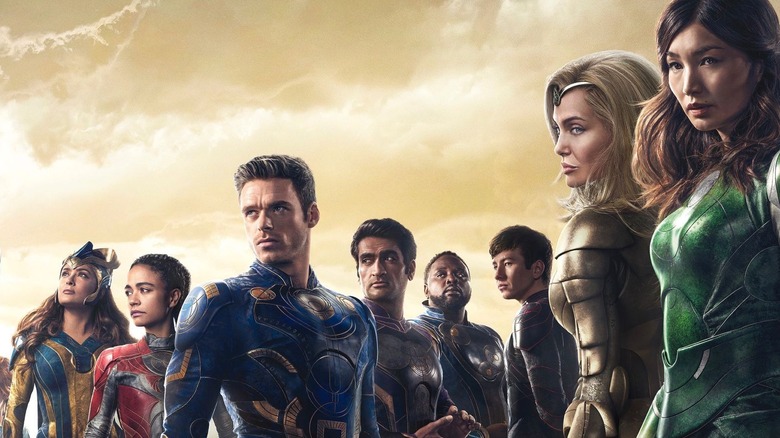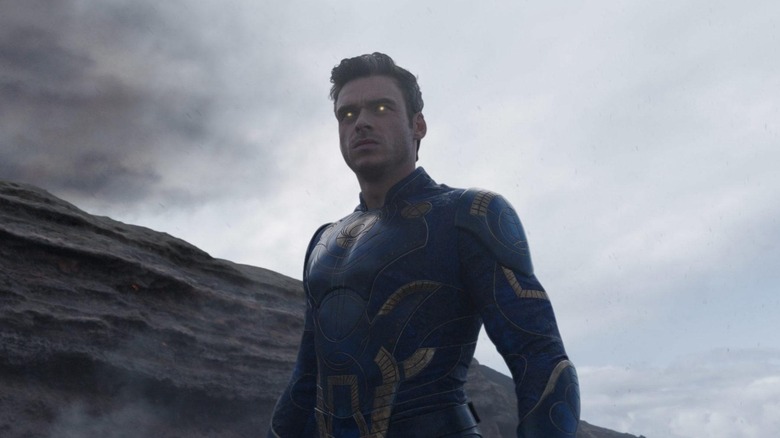Eternals Features A Death By Suicide — Did Marvel Handle It Responsibly?
Warning: This piece contains major spoilers for "Eternals," as well as sensitive, potentially triggering content.
Director Chloé Zhao has been given a lot of hype over the last few weeks for filming Marvel Studios' first full-on sex scene in "Eternals," but another important milestone that has been given less ink — no doubt due to its spoilery nature — is the fact that it also includes the first explicit suicide in the Marvel Cinematic Universe. Let's explore what happened to this major character, why they did what they did, and what it means for the MCU moving forward.
(If you or a loved one are a survivor of suicide, or have had suicidal ideations of any kind, please consider reaching out to a medical professional, or call the National Suicide Prevention Lifeline at 1-800-273-8255.)
Ikaris Flies Too Close To The Sun
The event in question occurs shortly after the climactic battle scene, where Ikaris (Richard Madden) attempted to keep his fellow Eternals from stopping the emergence of Tiamut. After the Celestial has been destroyed via Sersi's transmutation abilities (enhanced by the group's Uni-Mind), Ikaris apologizes to Sersi (Gemma Chan) for going against the group as well as for his murder of Ajak (Salma Hayek). He then flies off, leaving Earth and — in the spirit of his mythological namesake — flies into the sun, presumably dying.
This leaves the big question: Why did Ikaris choose to willingly end his own life? It is important to note that he and Ajak were the only two Eternals to know about the Celestials' true plan to use Earth and its people as, essentially, a giant incubator for newborn Celestial Tiamut. So where the other Eternals were duped into progressively shaping humanity over thousands of years, Ikaris always knew what the real mission was, a mission he was willing to kill his own brothers and sisters to complete for the sake of Tiamut's larger cosmic importance. Such "big picture" thinking is the same kind that led Thanos on his genocidal quest. When Ikaris realizes not only that he has failed in his great purpose but that also killed his friend in vain, it seems to have been too much for him to bear.
How Is This Different Than A Sacrifice?
You might be wondering how Ikaris' death is different from other similar deaths in the Marvel Cinematic Universe, and the answer lies in differentiating between suicide and self-sacrifice. At least for the purposes of this discussion, a suicide is an act someone chooses to make of their own free will (as Ikaris did) when they could still conceivably go on, whereas a sacrifice is an act of self-destruction for a greater cause when no other option is in site. Sacrifices in the MCU often happen during battles to save one or more individuals, as when Groot turns his body into a ball to shield his fellow Guardians from a fatal blast in 2014's "Guardians of the Galaxy," or in 2019's "Avengers: Endgame" when Natasha Romanoff valiantly throws herself off the cliff on Voromir so that Clint could gain the Soul Stone in order to defeat Thanos and bring back the trillions he evaporated. As Spock would say, "the needs of the many outweigh the needs of the few ... or the one."
But Marvel has occasionally gone into more flippant use of the self-sacrifice trope, as in 2015's "Avengers: Age of Ultron." Joss Whedon deliberately set up Hawkeye as the movie's version of the doomed "Dead Meat" character from "Hot Shots!" As a screenwriter Whedon played up all the typical Red Shirt clichés of Clint going on "one last mission," saying a long goodbye to his wife, and playing up how vulnerable and de-powered he is compared to everyone else. He subverts this by having Quicksilver speed in front of Ultron's hail of bullets, saving Hawkeye and a small innocent child. There was even a scene earlier on where Steve Rogers says (over a shot of Quicksilver), "You get hurt, hurt 'em back. You get killed ... walk it off." While the moment is heroic and poignant, it is also more than a little cynical in its attempt to kill off a character for shock value. Another similar, slightly disrespectful moment took place in this year's "Black Widow" solo movie, where enemy Widow agent Ingrid is forced to commit suicide by evil mind controller Dreykov via blasting herself in the head with a Widow Bite. It's a meaningless sacrifice meant to simply show how evil the bad guy is, and is made doubly ironic by happening in front of Natasha Romanoff, who would later sacrifice herself in a more impactful way.
Dan Romer is a noted psychologist and research director at the Annenberg Public Policy Center who has spent decades commenting on how suicide is portrayed in movies and TV. He too has defined suicidal behavior as depicting a character who had the "option of living but attempted or completed the taking of his/her life." In discussing the depiction of attempted suicide in 2001's Best Picture winner "A Beautiful Mind," Romer had this to say:
"If you try to struggle with the stresses of life alone, it's very difficult. To have someone supporting you and thinking and saying 'I'm going to be with you,' and 'I haven't given up on you,' those are all sources of optimism. In the film, they do make it look like Nash's wife helped him through that [period of despair], which is a positive message for people who might know others who are suicidal and might think there's no hope of them getting over it or recovering. Giving them support, reaching out to them is important, and can help."
Was Ikaris' Suicide Handled Well?
Romer has also said that, "Most portrayals of suicide are tragic and unpleasant, and they can look like, once you want to kill yourself, there's hardly anything you can do about it." With that in mind, the death of Ikaris in "Eternals" might not be the most sensitive portrayal. One of Sersi's great abilities is her incredible well of empathy, and yet when her great love Ikaris is at his lowest point she is unable to sense this or unwilling to reach out to help him before he flies off the planet. He simply, as Romer says, makes the decision and goes through with it.
Ikaris' suicide is certainly distinct from a sacrifice. Flying into the sun would not aid anyone's cause or save one person's life. It is an act of pure personal anguish where the character no longer sees a clear purpose for himself. The moment is filmed and scored as elegantly as we would expect from Zhao, performed with great morose sadness by Madden, and adds a downbeat element to a franchise we are used to playing a little safer. This may be one of the contributing factors to the film's poor critical reception, as it might have been a bridge too far into more dark, emotional territory than we're used to from Marvel. Grimdark we expect from DC, but not from the same studio that gave us "Ant-Man" or "Spider-Man: Homecoming." When we walk into a movie with ten Eternals standing proudly on the movie theater banner, we don't necessarily expect to walk out with only seven of them still breathing.
Of course, we are presuming that — like Steve Rogers in the first "Captain America" film — this isn't all just a big fake-out. There is nothing within the text of the film, however, to indicate anything other than the finality of his death. There is no funeral pod on the Genesis planet à la "Star Trek II," or Professor Xavier's voice coming out of a comatose patient as in the credits scene of "X-Men: The Last Stand." The character of Ikaris is directly compared to Superman in the film, so it's possible that like Kal-El, the sun may actually empower him rather than kill him. That's the more hopeful way of looking at it, anyway.



